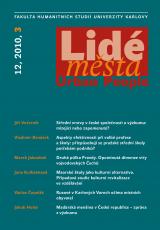Maorské školy jako kulturní alternativa
Případová studie kulturní revitalizace ve vzdělávání
DOI:
https://doi.org/10.14712/12128112.3593Klíčová slova:
New Zealand, Maori culture and identity, cultural revitalization, immersion schools, bilingualismAbstrakt
Compared to the indigenous australians, whose process of cultural revitalization in the urban context was discussed in my diploma thesis, the contemporary maori of new zealand have the significant advantage of having maintained their language and other areas of culture, which is notable on an everyday basis, whether it be community houses, native musical instruments, handcrafts, or traditional ceremonies on a marae. Past restrictions did not last long enough to suppress their language or to doubt the authenticity of their contemporary visual culture. The maori are continuously claiming their civil equality in areas of employment, politics, health care, or education. Maori schools represent a symbol of maori identity, since they are actively pursuing the goal of revitalizing and maintaining maori culture and language. This paper draws on my research at kohanga reo, a maori led pre-school centre in dunedin, new zealand. I used ethnographic methods of participant observation and interview. My dissertation thesis describes this topic in more detail.
Stahování
Publikováno
Jak citovat
Číslo
Sekce
Licence

Tato práce je licencována pod Mezinárodní licencí Creative Commons Attribution-NonCommercial-NoDerivatives 4.0.


